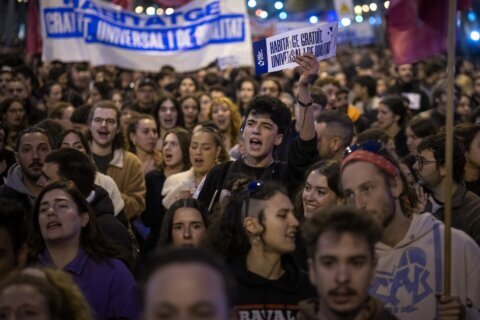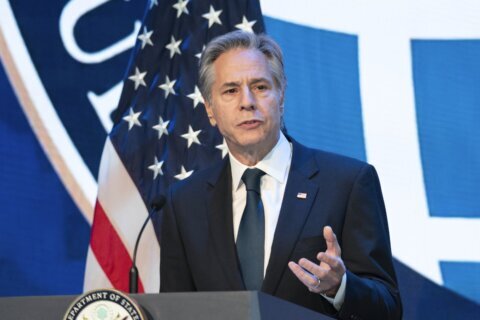Twitter needs to do more work to fall in line with the European Union’s tough new digital rulebook, a top EU official said after overseeing a “stress test” of the company’s systems in Silicon Valley.
European Commissioner Thierry Breton said late Thursday that he noted the “strong commitment of Twitter to comply” with the Digital Services Act, sweeping new standards that the world’s biggest online platforms all must obey in just two months.
However, “work needs to continue,” he said in a statement after reviewing the results of the voluntary test at Twitter’s San Francisco headquarters with owner Elon Musk and new CEO Linda Yaccarino.
Breton, who oversees digital policy, is also meeting other tech bosses in California. He’s the EU’s point person working to get Big Tech ready for the new rules, which will force companies to crack down on hate speech, disinformation and other harmful and illegal material on their sites. The law takes effect Aug. 25 for the biggest platforms.
The Digital Services Act, along with new regulations in the pipeline for data and artificial intelligence, has made Brussels a trailblazer in the growing global movement to clamp down on tech giants.
The mock exercise tested Twitter’s readiness to cope with the DSA’s requirements, including protecting children online and detecting and mitigating risks like disinformation, under both normal and extreme situations.
“Twitter is taking the exercise seriously and has identified the key areas on which it needs to focus to comply with the DSA,” Breton said, without providing more details. “With two months to go before the new EU regulation kicks in, work needs to continue for the systems to be in place and work effectively and quickly.”
Twitter’s global government affairs team tweeted that the company is “on track to be ready when the DSA comes into force.” Yaccarino tweeted that “Europe is very important to Twitter and we’re focused on our continued partnership.”
Musk agreed in December to let the EU carry out the stress test, which the bloc is offering to all tech companies before the rules take effect. Breton said other online platforms will be carrying out their own stress tests in the coming weeks but didn’t name them.
Despite Musk’s claims to the contrary, independent researchers have found misinformation — as well as hate speech — spreading on Twitter since the billionaire Tesla CEO took over the company last year. Musk has reinstated notorious election deniers, overhauled Twitter’s verification system and gutted much of the staff that had been responsible for moderating posts.
Last month, Breton warned Twitter that it “can’t hide” from its obligations after the social media site abandoned the bloc’s voluntary “code of practice” on online disinformation, which other social media platforms have pledged to support.
Combating disinformation will become a legal requirement under the Digital Services Act.
“If laws are passed, Twitter will obey the law,” Musk told the France 2 TV channel this week when asked about the DSA.
Breton’s agenda Friday includes discussions about the EU’s digital rules and upcoming artificial intelligence regulations with Meta CEO Mark Zuckerberg and OpenAI CEO Sam Altman, whose company makes the popular AI chatbot ChatGPT. But a briefing for journalists was canceled.
The DSA is part of a sweeping update to the EU’s digital rulebook aimed at forcing tech companies to clean up their platforms and better protect users online.
For European users of big tech platforms, it will be easier to report illegal content like hate speech, and they will get more information on why they have been recommended certain content.
Violations will incur fines worth up to 6% of annual global revenue — amounting to billions of dollars for some tech giants — or even a ban on operating in the EU, with its with 450 million consumers.
Breton also is meeting Jensen Huang, CEO of Nvidia, the dominant supplier of semiconductors used in AI sytems, for talks on the EU’s Chips Act to boost the continent’s chipmaking industry.
The EU, meanwhile, is putting the final touches on its AI Act, the world’s first comprehensive set of rules on the emerging technology that has stirred fascination as well as fears it could violate privacy, upend jobs, infringe on copyright and more.
Final approval is expected by the end of the year, but it won’t take effect until two years later. Breton has been pitching a voluntary “AI Pact” to help companies get ready for its adoption.
Copyright © 2024 The Associated Press. All rights reserved. This material may not be published, broadcast, written or redistributed.







